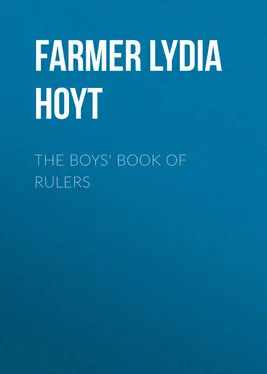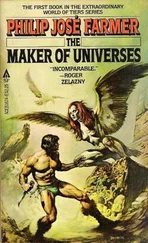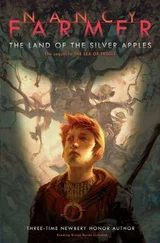Lydia Farmer - The Boys' Book of Rulers
Здесь есть возможность читать онлайн «Lydia Farmer - The Boys' Book of Rulers» — ознакомительный отрывок электронной книги совершенно бесплатно, а после прочтения отрывка купить полную версию. В некоторых случаях можно слушать аудио, скачать через торрент в формате fb2 и присутствует краткое содержание. Издательство: Иностранный паблик, Жанр: foreign_antique, foreign_prose, на английском языке. Описание произведения, (предисловие) а так же отзывы посетителей доступны на портале библиотеки ЛибКат.
- Название:The Boys' Book of Rulers
- Автор:
- Издательство:Иностранный паблик
- Жанр:
- Год:неизвестен
- ISBN:нет данных
- Рейтинг книги:4 / 5. Голосов: 1
-
Избранное:Добавить в избранное
- Отзывы:
-
Ваша оценка:
- 80
- 1
- 2
- 3
- 4
- 5
The Boys' Book of Rulers: краткое содержание, описание и аннотация
Предлагаем к чтению аннотацию, описание, краткое содержание или предисловие (зависит от того, что написал сам автор книги «The Boys' Book of Rulers»). Если вы не нашли необходимую информацию о книге — напишите в комментариях, мы постараемся отыскать её.
The Boys' Book of Rulers — читать онлайн ознакомительный отрывок
Ниже представлен текст книги, разбитый по страницам. Система сохранения места последней прочитанной страницы, позволяет с удобством читать онлайн бесплатно книгу «The Boys' Book of Rulers», без необходимости каждый раз заново искать на чём Вы остановились. Поставьте закладку, и сможете в любой момент перейти на страницу, на которой закончили чтение.
Интервал:
Закладка:
Lydia Hoyt Farmer
The Boys' Book of Rulers
The aim of this book is to give in as concise manner as possible, consistent with graphic narration and biographical completeness, the most important and interesting events in the lives of these famous rulers; together with a brief history of the various epochs in which they lived, and a description of the manners and customs of the people comprising the several nations governed by these illustrious monarchs.
The Author.AGAMEMNON
1184 B.C
“The rule
Of many is not well. One must be chief
In war, and one the king.” — Iliad.
FOR nine years the Greeks had besieged the city of Troy. This famous Trojan War, which is said to have occurred about 1184 B.C., has been embellished by romance and poetry; and although the real events have been much distorted by fabulous tales, it holds an important place in ancient Grecian history.
The marvellous Greek poet Homer has immortalized the wonderful story of this contest, in which, according to the old Grecian belief, gods and heroes fought for mastery; and it seems more fitting to the subject that we should view these events through the eyes of those ancient Greeks, whose weird yet fascinating fables peopled the mountains and seas with gods and goddesses; over whom proud Zeus or Jupiter ruled on the dread Mount of Olympus, from whence he hurled his awful thunderbolts, and shook the earth and heavens in his wrathful moods, when gods or mortals had dared to defy his imperial will. Agamemnon, king of Mycenæ, was the commander of all the Grecian hosts which for these nine years had surrounded the walls of Troy. The cause of the quarrel may be thus briefly stated: —
Priam was the richest and most powerful of all the kings of Troy. His wife, Queen Hecuba, had dreamed that one of her children should become a firebrand which should consume the whole city. Whereupon, Priam was so alarmed, that he ordered that her next child should be exposed in a desert place among the mountains, and left to perish. Paris was this child, and when an infant, was hidden by his mother, that he might not be thus destroyed. Paris grew to be a youth of marvellous beauty, and was at length brought by his mother to the court of Priam. The king was so charmed by his beauty and accomplishments, that Paris ventured to make himself known, and was received by Priam, his father, with great kindness; for he was so pleased with the noble youth, that he ceased to remember the evil dream. This dream, however, was very strangely fulfilled years afterwards. Paris made an expedition into Greece, which country was at that time divided into many small kingdoms or states, each governed by its own king. Agamemnon was king of Mycenæ, and his brother Menelaüs was king of Sparta.
Agamemnon and Menelaüs were the sons of Plisthenes; but as their father died when they were very young, their mother Aërope was afterwards married to Atreus; and these two brothers were brought up by their step-father as his own children, to whom his name was given, as they were called Atridæ.
Atreus was afterwards murdered, and Agamemnon’s uncle Thyestes ascended the throne of Mycenæ. Agamemnon and his brother Menelaüs then fled to Sparta. The king of Sparta agreed to recover the kingdom for Agamemnon, if he would marry his daughter Clytemnestra, and make her his queen. To this Agamemnon consented, and with the aid of Tyndarus, king of Sparta, he recovered his own kingdom, and married Clytemnestra. His brother Menelaüs afterwards became king of Sparta.
During the expedition into Greece, of Paris, the son of King Priam, he visited the court of Sparta, and was received most kindly by King Menelaüs. But the handsome and fascinating Paris ill-repaid this courteous reception, for he fell in love with Helen, the beautiful wife of Menelaüs, and carried her off with him on his return to Troy. Menelaüs, enraged at this wicked treachery, persuaded his brother Agamemnon, king of Mycenæ, to espouse his quarrel, and to join him in waging war with the Trojans, to revenge his indignity, and to recover, if possible, his wife, the fair Helen, who was so exquisitely beautiful, that all who saw her fell in love with her. Agamemnon was chosen commander-in-chief of all the powerful Grecian princes who now combined their forces to fight against Troy. Homer gives us the names of the most famous of these Grecian warriors. Agamemnon was sovereign lord of all the host, and Achilles was the bravest and most valiant man amongst them. But besides these, there was the yellow-haired Menelaüs, king of Sparta, and husband of the beautiful Helen; Ajax Oïleus, or, as men called him, the lesser Ajax, king of the Locri, swiftest of foot among the Greeks, after the great Achilles; Ajax Telamon, from Salamis; Diomed, son of Tydeus, king of Argos, and with him Sthenelus; Nestor, king of Pylos, oldest and wisest among the Greeks; Ulysses, king of Ithaca, most crafty in counsel; Idomeneus, grandson of the great judge Minos, king of Crete, and with him Meriones; Tlepolemus, son of Hercules, from Rhodes; Eumelus, from Pheræ, son of that Alcestis, who died for her husband, and was brought back from death by Hercules, according to Grecian mythology; and many more heroes too numerous to mention: but the bravest and strongest of all was Ajax, son of Telamon, and the best horses were those of Eumelus; but there was none that could compare with Achilles and the horses of Achilles, bravest of men, and swiftest of steeds.
The heroes upon the Trojan side were also great and brave. The most famous of their chiefs were Hector, son of King Priam, most valiant of all the Trojan warriors; Æneas, whose father was Anchises, and whose mother was supposed to be the goddess Aphrodité; Pandarus, from Mount Ida, to whom Apollo had given a marvellous bow; Asius, the son of Hyrtacus, who came from the broad salt river, the Hellespont; Pylæmenes, king of Paphlagonia; and Sarpedon from Lycia, whom men affirmed to be the son of Zeus himself; and lastly, Glaucus his friend.
When the Grecian fleet had started upon this expedition against Troy, a wonderful incident had occurred. The fleet of the Greeks was detained by contrary winds at Aulis, owing to the wrath of the goddess Diana, whom King Agamemnon had offended by killing one of her favorite deer. In this emergency Calchas the soothsayer was consulted, and he declared that to appease the anger of the goddess. Iphigenia, the eldest daughter of King Agamemnon, must be sacrificed. She was accordingly led to the altar, and was about to be offered as a victim, when she is said to have suddenly disappeared, being caught up by Diana, who in pity substituted a stag in her place. Virgil, however, tells this story somewhat differently; for he relates that Iphigenia was actually sacrificed. The goddess having been appeased, the winds were favorable, and the Grecian fleet sailed onward, and arrived safely at Troy; and for nine long years these famous warriors had been waging war around the walls of that city, within which, in the palace of Paris, son of King Priam, was concealed the matchlessly beautiful Helen, and much rich treasure, which that treacherous but fascinating prince had stolen from the Greeks.
But now within the Grecian camp a strife arises between King Agamemnon and Achilles, bravest of all his host. The Greeks, having been away from home so many years, were accustomed to make frequent raids upon the surrounding cities to supply their needs, and thus to enable them to continue still longer this weary siege. They had thus ruthlessly attacked a city called Chrysa, sacred to Apollo, where was a temple of that god.
The Greeks, in their plunderings, had not dared to molest the temple or its priest; but they had carried off, with other prisoners, the daughter of the priest of Apollo, named Chryseïs. The spoils obtained from these expeditions were divided between the various kings and heroes in the Grecian host; and the maiden Chryseïs had been apportioned as the share of King Agamemnon. The next day the priest Chryses came to the Grecian camp, bringing much gold, and wearing on his head the priest’s crown, that men might thereby reverence him the more. He demanded the return of his daughter, and offered his gold as her ransom. The Grecian chiefs were favorable to his suit, but King Agamemnon angrily repulsed him, exclaiming, —
Читать дальшеИнтервал:
Закладка:
Похожие книги на «The Boys' Book of Rulers»
Представляем Вашему вниманию похожие книги на «The Boys' Book of Rulers» списком для выбора. Мы отобрали схожую по названию и смыслу литературу в надежде предоставить читателям больше вариантов отыскать новые, интересные, ещё непрочитанные произведения.
Обсуждение, отзывы о книге «The Boys' Book of Rulers» и просто собственные мнения читателей. Оставьте ваши комментарии, напишите, что Вы думаете о произведении, его смысле или главных героях. Укажите что конкретно понравилось, а что нет, и почему Вы так считаете.












